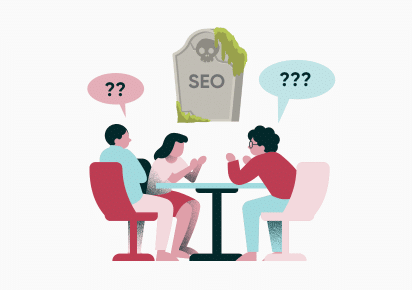Our Links Are Trusted By 2,500+ SEO Agencies
Our Links Are Trusted By 2,500+ SEO Agencies

Is SEO dead? Absolutely not. SEO is evolving but remains a vital component of digital marketing.
This article breaks down the myths, explores the transformations happening in SEO, and highlights how you can adapt to stay effective in 2025 and beyond.
SEO is not dead; it is evolving to focus more on user experience and high-quality content amidst changing digital landscapes.
Challenges such as AI-driven search results and increasing dominance of paid ads are shifting the SEO landscape, requiring marketers to innovate strategies.
Future SEO success will hinge on adapting to trends like voice search, long-tail keywords, and maintaining high user engagement metrics.
The SEO industry is currently in a transformative phase, showing significant changes and adaptations. Despite the constant buzz about SEO being dead, it continues to thrive and remain relevant as a crucial component of digital marketing in 2025.
The evolution of SEO indicates a shift towards becoming more human-centric, enhancing user experiences and aligning with consumer needs.
SEO remains a fundamental element of marketing strategies despite differing views. Recent data confirms that SEO delivers high-quality traffic and ROI, solidifying its status as a viable marketing channel.
Google continues to be a primary source for B2B research, underscoring the need for effective SEO strategies.
Misconceptions and the evolving digital marketing landscape fuel the belief that SEO is dead. Predictions about SEO’s decline have consistently proven to be incorrect over the years. Rather than dying, SEO is evolving to meet the changing needs of consumers, focusing more on unique, expert-backed content.
Some marketers consider SEO outdated due to its reliance on outdated techniques, like keyword optimization. AI tools and zero-click searches have changed user behavior, reducing the effectiveness of traditional SEO strategies.
The combined effect of these changes leads many to believe that SEO is becoming irrelevant.
Google’s Search Generative Experience (SGE) delivers AI-generated answers directly within google search results, posing a significant challenge to traditional SEO practices.
By providing information directly on the SERPs, new features reduce click-through rates and the need for users to visit external websites. This shift challenges the traditional keyword-focused approach to SEO.
However, SGE might not significantly affect technical searches or long-tail keyword queries. While it is expected to reduce organic traffic for many keywords by providing complete answers directly, it could also breathe new life into SEO by pushing practitioners to innovate and adapt.
Paid search results are increasingly dominating the top positions of search engine results, overshadowing organic links. Google has introduced paid local businesses results related to search queries to enhance user experience and drive more traffic to advertisers.
This dominance of paid search results means that organic links are pushed further down the page, making it harder for them to attract clicks. Understanding unethical practices like link farms can provide insights into maintaining and improving organic visibility.
The prominence of paid search results heightens competition for organic rankings. Marketers must innovate to keep their content visible and relevant amid this shift.
Marketers are increasingly gravitating towards social media and PR campaigns, believing these methods offer better returns than SEO. The shift is largely driven by the perceived effectiveness of social media and PR in reaching and engaging audiences compared to traditional SEO.
Social media platforms provide direct interaction with users, allowing for more personalized and immediate engagement. PR campaigns help build brand credibility and visibility in ways that traditional SEO might not immediately achieve.
This shift reflects a broader trend in digital marketing, where multi-channel strategies are becoming essential for success.
Despite the challenges, organic SEO remains resilient. Quality content has become a primary ranking factor for search engines, surpassing other SEO aspects.
E-E-A-T (Experience, Expertise, Authoritativeness, Trustworthiness) is key for high-ranking content, highlighting the need for valuable and trustworthy information.
Google’s core updates promote high-quality content, impacting search results by reducing low-quality content. High-quality content, user experience, and backlinks are currently the top factors influencing Google’s search rankings. Effective SEO strategies must focus on creating content that meets user search intent and is backed by solid expertise.
Approximately 49% of marketers believe that organic search provides the highest return on investment compared to other marketing channels.
The number one result on Google captures about 27.6% of all clicks, highlighting the significant impact of achieving high search engine rankings. This resilience underscores the continued importance of organic SEO in driving traffic and delivering value.
The SEO landscape is fraught with challenges. Google updates pose a constant threat, making it crucial for SEOs to stay adaptable. Traditional SEO strategies are no longer as effective, requiring a new approach to succeed.
Keeping abreast of the latest SEO trends and challenges is crucial for digital marketers to stay up to date.
Staying informed about algorithm changes is essential to mitigate potential traffic losses. Following SEO best practices is vital to avoid being negatively impacted by updates. Given the frequency and impact of these updates, SEOs need to stay ahead by continually adapting their strategies.
A proactive approach to algorithm updates aids SEOs in maintaining rankings and content visibility. This involves regularly reviewing and adjusting SEO strategies to align with the latest algorithmic trends and requirements.
Content saturation refers to the abundance of content making it hard to stand out. This saturation makes it difficult for fresh material to gain visibility online. To overcome this challenge, creating a high-quality content strategy that prioritizes quality over quantity is essential.
Most B2B content often suffers from a lack of originality, making it feel repetitive to buyers. Over 50% of buyers believe that B2B content is too long and repetitive. Therefore, focusing on creating balanced, high-quality content that serves both search engines and users is crucial.
Employing a varied vocabulary and avoiding keyword stuffing enhances reader engagement.
The dominance of mobile traffic requires websites to prioritize mobile-first design for improved user experience.
Improving site speed and navigation can enhance user experience and engagement metrics, which are crucial for maintaining high search engine rankings.
Mobile-first indexing optimization requires responsive and mobile-friendly websites. This shift reflects the growing importance of mobile traffic in driving organic results and underscores the need for SEOs to adapt their strategies accordingly.
The future of SEO is shaped by emerging trends and technologies. AI tools are emerging as alternatives to traditional search engines, signaling a fundamental change in the SEO landscape. Refining fundamental principles of SEO will be crucial as new technologies reshape the search dynamic.
Future SEO strategies will hinge on understanding user behavior and intent.
Artificial intelligence is transforming SEO practices by offering new opportunities for content analysis and optimization. AI tools assist in analyzing competitors and identifying content gaps, greatly aiding content creation.
However, while AI aids in analysis, skilled creators are essential for crafting compelling narratives and unique perspectives. As of now, 67% of businesses are using AI, and the global AI market is expected to expand further. By 2025, it is projected that there could be 97 million people working in the AI sector. This number indicates significant growth in the field.
Experience, expertise, authority, and trust are crucial elements that helpful content must demonstrate to improve SEO performance. Employing experienced content creators enhances search engine rankings.
Google’s updates have prioritized content based on first-hand experiences provided by recognized authors. Author credibility boosts content trust and enhances SEO performance. Longer engagement time on a webpage can significantly improve SEO rankings.
Voice search is rapidly becoming a prevalent method for users to interact with search engines in various contexts. It is primarily used for quick factual inquiries and local business searches.
Voice search’s rise demands that SEO strategies adapt, focusing on conversational keywords and local SEO.
As of 2023, 27% of searches in the Google App are now done by voice, with this predicted to increase to 50% by the end of 2025. Indicting a significant shift in user behavior towards more natural, hands-free interaction with technology..
To succeed in SEO in 2025, brands must adapt their strategies by creating content that provides genuine value to modern searchers. This involves focusing on uniquely valuable content tailored to the audience’s needs and leveraging the latest SEO trends and technologies.
Long-tail keywords are longer and more specific keyword phrases that target niche segments of a market. These keywords offer a better chance of ranking well due to lower competition.
Because long-tail keywords are less commonly searched, they generally attract fewer competitors, enabling more opportunities for visibility. Greater specificity in targeting long-tail keywords can improve conversion rates and SEO performance.
A featured snippet is displayed at the top of SERPs, answering queries concisely. These snippets provide direct answers to user queries, enhancing visibility in search results.
Featured snippet optimization can greatly enhance search result visibility. This involves structuring content to address common user queries clearly and concisely.
User experience is crucial for improving user engagement metrics, as it directly influences how users interact with content. Overly strict adherence to SEO guidelines can make content unnatural and hard to read, damaging user experience.
A poor user experience reduces engagement and increases bounce rates, which can negatively impact SEO performance. Creating engaging content that aligns with user intent and delivers real value is crucial for improving user engagement metrics.
In conclusion, SEO is far from dead. Despite the challenges and misconceptions, it continues to evolve and adapt to the changing digital landscape.
Quality content, user experience, and innovative SEO strategies remain central to achieving high search engine rankings and driving organic traffic.
As we move forward, staying informed about the latest trends and continuously refining SEO practices will be crucial for success.
By embracing new technologies and focusing on delivering genuine value to users, SEO will continue to be a vital component of digital marketing strategies.
No, SEO is not dead; it is evolving and remains essential for effective digital marketing. Adapting to changes in search algorithms and user behavior is key for success.
Google’s Search Generative Experience (SGE) provides AI-generated answers directly in search results, significantly altering the landscape of traditional SEO practices. This innovation streamlines information retrieval for users.
Marketers are increasingly shifting towards social media and PR campaigns because they provide better returns and facilitate direct engagement with users, surpassing the effectiveness of traditional SEO methods.
This trend highlights the evolving landscape of digital marketing and the importance of connecting with audiences directly.
Long-tail keywords are specific, longer phrases that focus on niche markets, providing less competition and often resulting in higher conversion rates. Utilizing them can significantly enhance your online visibility and effectiveness in reaching targeted audiences.
To optimize for featured snippets, structure your content to directly address common user queries in a clear and concise manner. Focus on using headers and bullet points to enhance readability and ensure you’re providing precise answers.

Join 26,000+ Businesses Growing with Rhino Rank
Sign Up